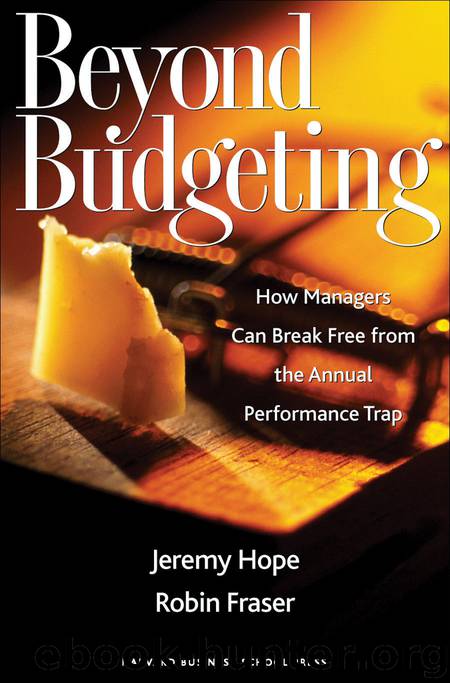Beyond Budgeting by Hope Jeremy; Fraser Robin;

Author:Hope, Jeremy; Fraser, Robin;
Language: eng
Format: epub
Publisher: Harvard Business Review Press
Published: 2011-06-02T16:00:00+00:00
How the Failure to Change Existing Budgeting Processes Led to the Ineffective Decentralization of a U.K. Building Services Company
The company was the largest U.K. subsidiary of a global giant that had over the past decade gained a reputation for being a successful exemplar of a modern decentralized organization. Its chairman had been interviewed by the Harvard Business Review and became a media star. He believed that the only way to structure a complex global organization was to decentralize responsibilities and make the organization as simple and local as possible. He stated that the company’s managers had well-defined sets of responsibilities, clear accountability, and maximum degrees of freedom to execute actions.
Our visit to the company was organized in such a way that we were able to discuss these issues with senior finance and human resources executives, and some operating managers from regional and local depots. The extent of disagreement about how they managed the business caught us by surprise. While the group finance people clearly thought that local leaders had adequate freedom and capabilty to manage the business effectively, local managers took an opposite view. A couple of examples will illustrate these divisions.
The building and contracting industry in the United Kingdom is not known for its ability to provide innovative solutions to its customers. It’s a mature market with heavy emphasis on price. We asked, “Is there a paucity of ideas and radical thinking at the company?” “Not at all,” was the reply from both a regional and a profit center manager. They elaborated: “It would take us just two days to come up with a dozen radical ideas, but if we couldn’t demonstrate that they would bring immediate profits, then we wouldn’t be given a hearing.” “There are no simple routes for the development and communication of new ideas,” was another comment we heard. Such views came as a surprise to head office executives who believed they were open and responsive to new ideas. The budgeting and control system militates against such processes being effective in practice.
Another example concerned the opportunity to acquire a star salesman who became available rather inconveniently during the middle of the year (i.e., not when the budget was being submitted). Everything about him was right, including his experience, his knowledge of customers and competition, and his ideas, which might have helped the company gain access to new markets. However, the local manager was over his budgeted headcount, and despite remonstrations up the line, he couldn’t get approval to take on anyone else. So he turned to one of his colleagues in another profit center. Could the salesman be accommodated within his budget? The answer was no. Why should he take the risk when the same opportunity might happen to him next week? Such is the perversity of the budgeting process that a person who could add significantly to the company’s intangible assets and potential profitability was allowed to join the competition. This is a story from the front line at the company. Given that one
Download
This site does not store any files on its server. We only index and link to content provided by other sites. Please contact the content providers to delete copyright contents if any and email us, we'll remove relevant links or contents immediately.
Hit Refresh by Satya Nadella(9115)
The Compound Effect by Darren Hardy(8918)
Change Your Questions, Change Your Life by Marilee Adams(7732)
Nudge - Improving Decisions about Health, Wealth, and Happiness by Thaler Sunstein(7689)
The Black Swan by Nassim Nicholas Taleb(7097)
Deep Work by Cal Newport(7056)
Rich Dad Poor Dad by Robert T. Kiyosaki(6595)
Daring Greatly by Brene Brown(6500)
Principles: Life and Work by Ray Dalio(6401)
Playing to Win_ How Strategy Really Works by A.G. Lafley & Roger L. Martin(6206)
Man-made Catastrophes and Risk Information Concealment by Dmitry Chernov & Didier Sornette(6001)
Digital Minimalism by Cal Newport;(5745)
Big Magic: Creative Living Beyond Fear by Elizabeth Gilbert(5744)
The Myth of the Strong Leader by Archie Brown(5491)
The Slight Edge by Jeff Olson(5405)
Discipline Equals Freedom by Jocko Willink(5371)
The Motivation Myth by Jeff Haden(5202)
The Laws of Human Nature by Robert Greene(5154)
Stone's Rules by Roger Stone(5078)
